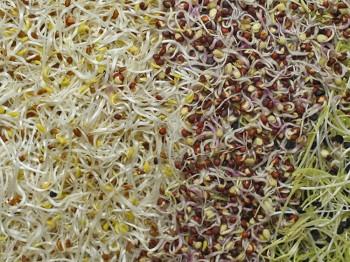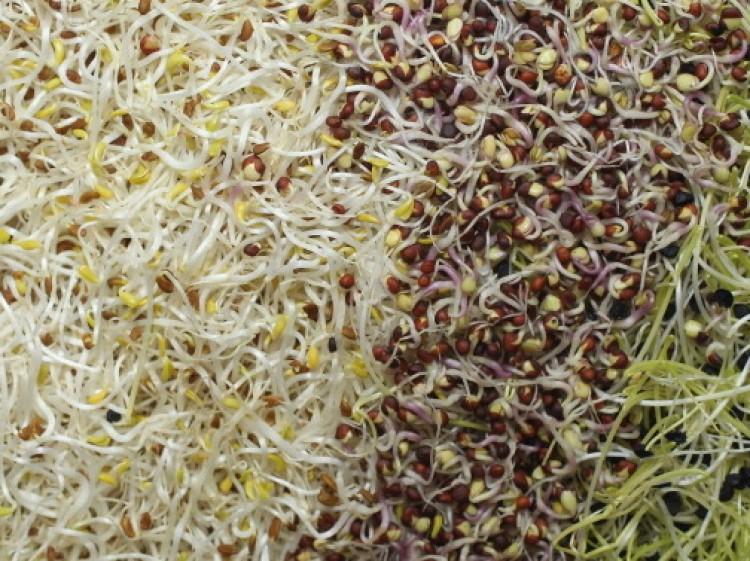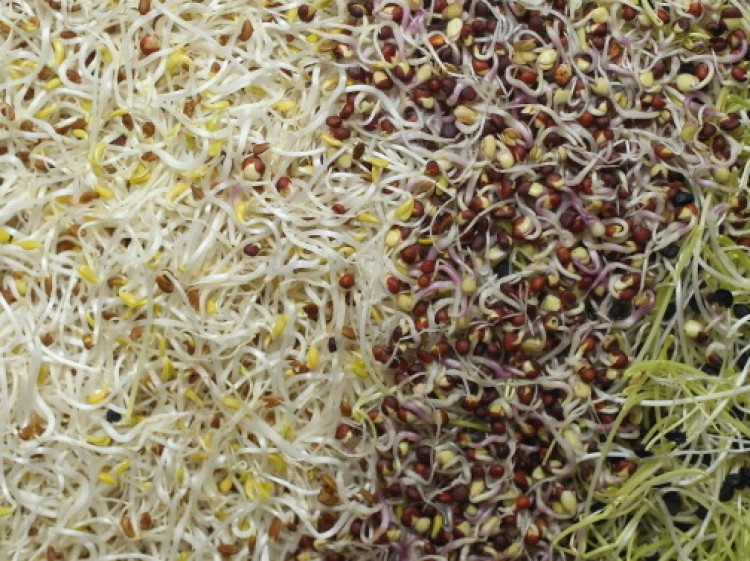WOERDEN, The Netherlands—“Take cucumber break” as proposed by some Dutch politicians last week and practiced by almost everyone in the eurozone, turns out to have been unnecessary. Despite insinuations from Germany that quickly devastated Spanish cucumber farmers, investigators discounted cucumbers as the cause of the still mysterious E. coli outbreak.
Determining what is not the cause helps diminish suspicion against cucumbers, but it simultaneously arouses suspicion against all other vegetables. The next suspects were sprouts, bean shoots, peas, beans and lentils, according to the German minister of agriculture.
Mistranslation from German into Dutch, two related languages, almost caused the Dutch to ban the wrong vegetable. The German word “sprossen” was wrongly translated as “spruiten,” which means Brussels sprouts, but apparently should mean “bean sprouts or shoots.” Translation is an undervalued craft.
Dutch online newspaper photos of magnified Brussels sprouts with headlines such as Hot Track Leads to Brussels Sprouts—which as a matter of fact, only grow in winter—were quickly replaced by photos of magnified bean sprouts.
I actually thought bean sprouts only grow in Asia, but I was wrong. Preliminary tests found that bean sprouts and other vegetable sprouts from a farm between the northern German cities of Hamburg and Hannover could be linked to infections in five German states. But that too seems to be discounted now.
The E. coli bacteria is said to be toxin-producing and appears to be immune to common antibiotics.
Precautionary advice given to us by the Dutch state secretary of Agriculture—while admitting that he could understand why people are less inclined to buy vegetable … [fill in the blank]—is that it’s incredibly important to wash your hands well and to wash, peel, and cook vegetables well.
This advice is a lot cheaper and more practical than the precautionary measures taken at the time when the threat of the Mexican flu (a.k.a. swine flu, H1N1) was lurking around the globe. Our former minister of Public Health, Ab Klink, preferred to err on the side of caution and ordered a vaccine for every inhabitant in the country, costing us dearly.
Critics call this “panic industry.” An industry, in this case the pharmaceutical industry, that thrives on fear. This time, however, the same fear is wrecking the vegetable industry.
When Germany pointed a finger at cucumbers from Spain, the Czech Republic and France removed Spanish cucumbers from stores. Russia banned all imports on vegetables from Europe. Belgium banned cucumbers from Spain. The Netherlands halted cucumber shipments to Germany. Now we start again with bean sprouts, or whatever vegetable is next suspected?
In the meantime, vegetable growers are seeking compensations from the European Union for lost vegetables sales in the hundreds of millions of euros.
Until the cause of the E. coli bacteria is finally determined, with certainty, efforts to curb the disease might prove more destructive rather than effective. I am not personally a fan of sprouts, but may consider eating some to support vegetable growers and to break the cycle of fear.
Determining what is not the cause helps diminish suspicion against cucumbers, but it simultaneously arouses suspicion against all other vegetables. The next suspects were sprouts, bean shoots, peas, beans and lentils, according to the German minister of agriculture.
Mistranslation from German into Dutch, two related languages, almost caused the Dutch to ban the wrong vegetable. The German word “sprossen” was wrongly translated as “spruiten,” which means Brussels sprouts, but apparently should mean “bean sprouts or shoots.” Translation is an undervalued craft.
Dutch online newspaper photos of magnified Brussels sprouts with headlines such as Hot Track Leads to Brussels Sprouts—which as a matter of fact, only grow in winter—were quickly replaced by photos of magnified bean sprouts.
I actually thought bean sprouts only grow in Asia, but I was wrong. Preliminary tests found that bean sprouts and other vegetable sprouts from a farm between the northern German cities of Hamburg and Hannover could be linked to infections in five German states. But that too seems to be discounted now.
The E. coli bacteria is said to be toxin-producing and appears to be immune to common antibiotics.
Precautionary advice given to us by the Dutch state secretary of Agriculture—while admitting that he could understand why people are less inclined to buy vegetable … [fill in the blank]—is that it’s incredibly important to wash your hands well and to wash, peel, and cook vegetables well.
This advice is a lot cheaper and more practical than the precautionary measures taken at the time when the threat of the Mexican flu (a.k.a. swine flu, H1N1) was lurking around the globe. Our former minister of Public Health, Ab Klink, preferred to err on the side of caution and ordered a vaccine for every inhabitant in the country, costing us dearly.
Critics call this “panic industry.” An industry, in this case the pharmaceutical industry, that thrives on fear. This time, however, the same fear is wrecking the vegetable industry.
When Germany pointed a finger at cucumbers from Spain, the Czech Republic and France removed Spanish cucumbers from stores. Russia banned all imports on vegetables from Europe. Belgium banned cucumbers from Spain. The Netherlands halted cucumber shipments to Germany. Now we start again with bean sprouts, or whatever vegetable is next suspected?
In the meantime, vegetable growers are seeking compensations from the European Union for lost vegetables sales in the hundreds of millions of euros.
Until the cause of the E. coli bacteria is finally determined, with certainty, efforts to curb the disease might prove more destructive rather than effective. I am not personally a fan of sprouts, but may consider eating some to support vegetable growers and to break the cycle of fear.





